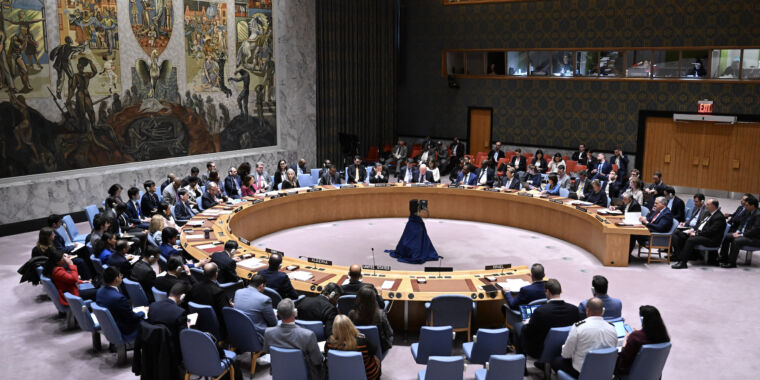The Detrimental Ramifications of Russia’s Veto on a UN Resolution
Wednesday’s veto by Russia in the United Nations Security Council thwarted a resolution that sought to reaffirm a ban established almost half a century ago on deploying weapons of mass destruction in orbit. This veto, while expected due to Russia’s status as one of the Council’s five permanent members with veto power, raised concerns globally. The resolution received support from 13 other member states, with China opting to abstain from the vote.
Revisiting the 1967 Outer Space Treaty
The proposed resolution aimed to reinforce Article IV of the 1967 Outer Space Treaty, which explicitly prohibits nations from launching objects carrying nuclear weapons or any other forms of weapons of mass destruction into Earth’s orbit. The objective was to uphold the sanctity of outer space as a demilitarized zone and prevent the potentially catastrophic consequences of weaponizing this environment.
Currently, Russia is among the 115 signatories of the Outer Space Treaty; however, recent reports in February indicating the development of a nuclear anti-satellite weapon by the Russian government have raised alarms. The revelations by President Biden’s administration shed light on Russia’s clandestine efforts to equip a satellite with a nuclear device, contradicting public assurances by President Putin disavowing such intentions.
Global Concerns and Resistance
The joint resolution brought forward by the United States and Japan urged nations to refrain from developing nuclear or other forms of weapons of mass destruction designed for deployment in space. The key focus was on averting the catastrophic implications of a nuclear detonation in space. The United States diplomats underscored the severe repercussions such an event would have on sustainable development, international peace, and security.
Despite China’s decision to abstain from the vote instead of supporting the resolution, the United States ambassador to the UN expressed disappointment in China’s alignment with Russia, highlighting the prioritization of their partnership over upholding global nonproliferation norms.
The Shadow of Anti-Satellite Weaponry
Russia’s historical inclination towards anti-satellite weaponry, evident in the Soviet Union’s previous endeavors, continues to resurface through modernized technologies. The shift in military focus towards assets capable of neutralizing space-based threats raises concerns about the militarization of outer space and its ramifications.
While details regarding Russia’s exact anti-satellite weapon specifications remain undisclosed, the potential threat posed by a nuclear explosion in space must not be underestimated. The debris resulting from such an event could disrupt crucial orbital infrastructure and pose risks to satellites from multiple countries.
Despite condemnatory responses to Russia’s veto in the Security Council, efforts to promote peace in space endure. The amendments proposed by Russia and China, although not adopted, underscore the ongoing dialogue around the necessity to maintain outer space as a peaceful domain free from weapons of mass destruction.
Image/Photo credit: source url





